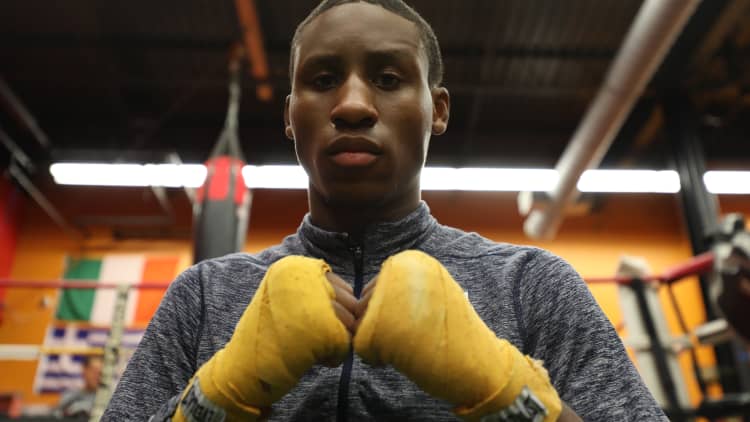When a former emergency room nurse in Saginaw, Michigan shared a video demonstrating why wearing medical gloves doesn't necessarily protect you from Covid-19 on April 6, it went viral.
Using blue paint to illustrate germs, Molly Lixey, who is now an outpatient nurse, showed how easy it is for cross-contamination to occur and germs to spread while wearing a pair of gloves while grocery shopping.
"There's no point wearing gloves if you're not going to wash your hands every time you touch something," she said in the video.
And while it might seem like wearing medical gloves (which are made of natural latex or other stretchy synthetic materials) when you run essential errands would protect you from Covid-19, that's not exactly the case.
As Lixey said in her video, "if you want to wear gloves, that's all fine...," but you have to be very careful.
Here's what you need to know.
Gloves can give a false sense of security
Gloves can be "a little bit deceptive," Dr. Mary E. Schmidt, a board-certified infectious disease specialist and associate professor of clinical medicine at Virginia Commonwealth University, tells CNBC Make It.
"People get this idea that they're protected, and then use gloves to touch themselves or touch their face," she says.
"As soon as those gloves are contaminated, it's just like having your [bare] hands."
In other words, wearing gloves gives you a false sense of security, and could make you less careful about other hand hygiene practices, like washing your hands or avoiding touching your face.
You can easily contaminate yourself with gloves if you don't use them properly
Another issue: You're more likely to contaminate yourself when you're wearing gloves, Schmidt says.
Remember that anything you touch with your gloved hands — like your phone, wallet or purse — is technically contaminated. You shouldn't be touching your face, fiddling with your mask or doing anything else that you wouldn't do with bare hands.
This cross-contamination often happens when you're putting on and taking off gloves. Like wearing masks and cloth face coverings, there's technique involved.
Before you put on a new pair of gloves, it's important to wash your hands or use a hand sanitizer. Make sure that the gloves aren't ripped, soiled or discolored and pull them up so they cover your wrist.
Then, while you're using your gloves, Schmidt suggests using paint imagery, just like Lixey did in her video.
"When you go into a place, assume that everywhere you walk or places that you could touch there's [wet] blue paint," she says. It might sound strange, but the idea is that the paint makes you more mindful of the surfaces you touch and how long germs can linger on your hands.
Gloves must be taken off from the inside out to avoid contamination, Schmidt says.
Grab the outside of one of your gloves and turn it inside out as you peel it off your hand. Hold the dirty glove in the hand that's still covered, then use your bare hand to reach into the inside of the other glove and turn it inside out, being extra careful not to touch the outside of either glove.
(The CDC has a helpful graphic that illustrates how to remove gloves.)
Throw out your gloves and wash your bare hands really well again or use hand sanitizer, Schmidt says.
And don't reuse gloves: "A lot of people would go home and try to wash them out," she says. "That's a little dangerous."
Who should wear gloves
People who are caring for someone who is infected with Covid-19 should wear disposable gloves when cleaning surfaces, washing dishes and doing laundry for a sick person, according to the CDC. When you're coming in direct contact with an infected person, you're directly exposed to more of the virus. (If gloves aren't available, the CDC urges you to wash your hands after handling a sick person's clothing or dishes.)
The FDA is also aware that the need for gloves may "outpace the supply available to health care organizations." Keep in mind that there is a shortage of other crucial personal protective equipment, such as face masks and N95 respirators.
You should continue to disinfect surfaces that you touch with gloved hands, such as your doorknobs, counters and reusable bags.
While gloves aren't a necessity at this point in time, one piece of gear the general population should definitely be wearing to prevent the spread of Covid-19 is a cloth face covering.
Check out: The best credit cards of 2020 could earn you over $1,000 in 5 years
Don't miss:



